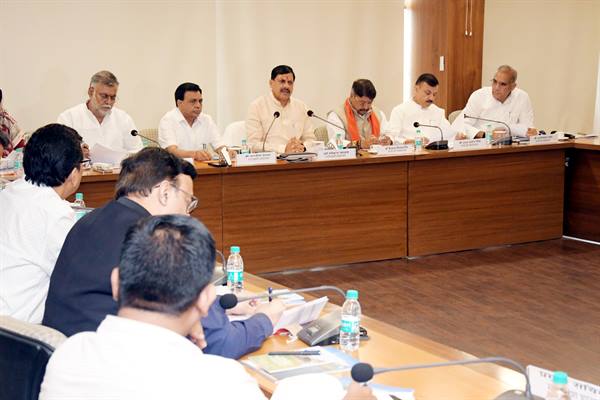
Team News Riveting
Bhopal, September 13
Chief Minister Dr Mohan Yadav exhorted that Amarkantak, the origin place of the state’s lifeline Maa Narmada, should be managed through the Amarkantak Development Authority while giving top priority to environmental protection.
For future settlements, satellite cities should be developed by identifying land away from the origin of the Narmada river. It should be ensured that from Amarkantak, the origin of Narmada, to the border of the state, sewage from any settlement does not get into the Narmada for which work should be done by setting a time limit. Latest technologies should be used for solid waste management. For environmental protection, the activities going on around Narmada should also be monitored through satellite imagery and drone technology. It should also be ensured that meat and liquor are not consumed in religious towns situated on the banks of river Narmada and in and around religious places. He directed to ban mining activities using machines in the river.
The Chief Minister was addressing the Cabinet meeting held at Sushasan Bhawan with the aim of making an action plan to keep the water of Maa Narmada clean and flowing continuously. Deputy Chief Minister Jagdish Deora, Urban Development and Housing Minister Kailash Vijayvargiya, Panchayat and Rural Development Minister Prahlad Patel, Transport and School Education Minister Uday Pratap Singh, Public Health Engineering Minister Smt. Sampatiya Uike, Chief Secretary Smt. Veera Rana besides officials of different departments were present.
Voluntary organizations, spiritual forums and general public should also be made participants
Chief Minister Dr. Yadav said that Maa Narmada is the center of reverence, faith, and belief for the people of the state. It is not just a river, it is our cultural heritage. It is necessary to save rivers and other water sources from the ill effects of a consumer-based lifestyle that has caused damage to nature and the environment. The state government has resolved for the integrated development of the Narmada for which continuous activities are being undertaken. With the active participation of various government departments, voluntary organizations, spiritual forums, and the general public, the scheme of Narmada conservation and promotion will be implemented using the latest technology and resources. Suggestions and innovative measures are invited from everyone for Narmada conservation. Chief Minister Dr. Yadav also gave instructions to prepare an action plan for the upgradation of Mamleshwar Temple located at Omkareshwar and to discuss this matter with the Central Government and the Archaeological Survey of India (ASI). Chief Minister Dr. Yadav said that this is the first meeting for the integrated development of Maa Narmada. The activities being implemented in this connection will be reviewed again in the second week of November.
Connect local youth with employment activities through home stay-food arrangements and information center on Parikrama Path
Chief Minister Dr. Yadav said that by identifying the expanse on both sides of the Narmada River through GIS and drone survey, a plan should be prepared in a coordinated manner by various departments for the conservation of the area. This is the only river in the world that is circumambulated. Therefore, to develop Parikrama as a major religious and tourist activity, Parikrama paths have been developed for the convenience of the people. By identifying spots on the Parikrama path, activities towards infrastructure development should be initiated through local panchayats and committees. Along with this, self-help groups and local youth should be motivated to develop homestays for arranging accommodation and food, etc. for those taking the Parikrama. Along with installing sign boards on the Parikrama path, information centers should be developed at the local level. This will help generate employment for the youth.
Activities should be conducted to conserve and promote the rich biodiversity of the Narmada Kshetra
Chief Minister Dr. Yadav said that the plantation of Sal and Teak and cultivation of herbs should be encouraged in the tribal-dominated areas existing on both sides of the Narmada River and activities should be conducted by involving the experts of Botany and Zoology in conservation and promotion activities of the rich biodiversity. Along with this, natural farming should be encouraged for five kilometers on both sides of the river, this will help in preventing pesticides and other chemicals from entering the Narmada. He said that geologically important places in the Narmada Kshetra should also be protected.
There are 430 ancient Shiva temples and two Shaktipeeths present on the banks of Narmada
It was informed in the meeting that the length of 1312 km long Narmada river in Madhya Pradesh, which starts from Amarkantak and meets the Gulf of Khambhat, is 1079 km. There are 21 districts, 68 tehsils, 1138 villages and 1126 ghats on the banks of Narmada. There are 430 ancient Shiva temples and two Shaktipeeths present on the banks of Narmada. Also, there is sufficient faith and recognition among the general public towards many places and ghats. Suggestions were also presented by ministers and officials in the meeting.



